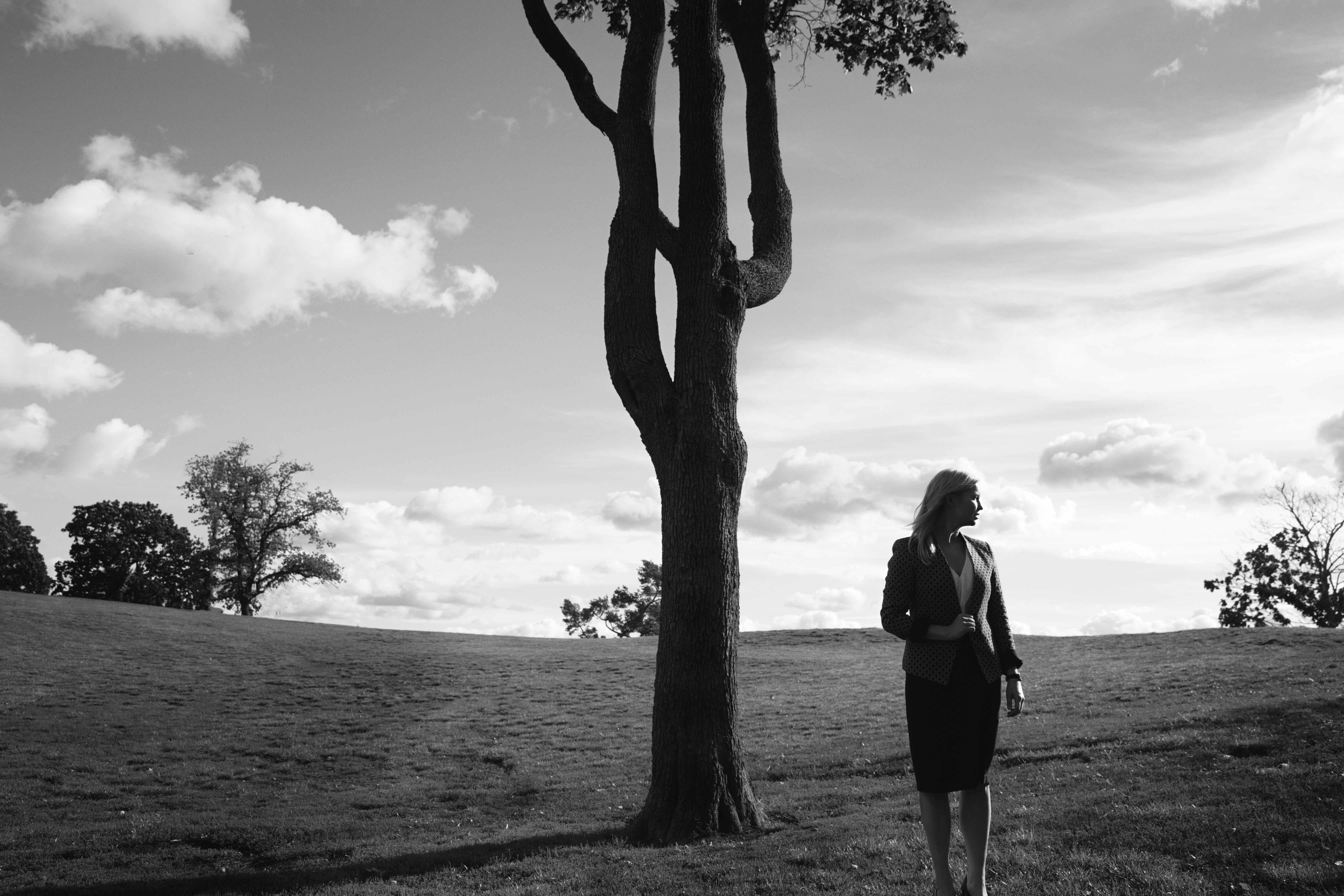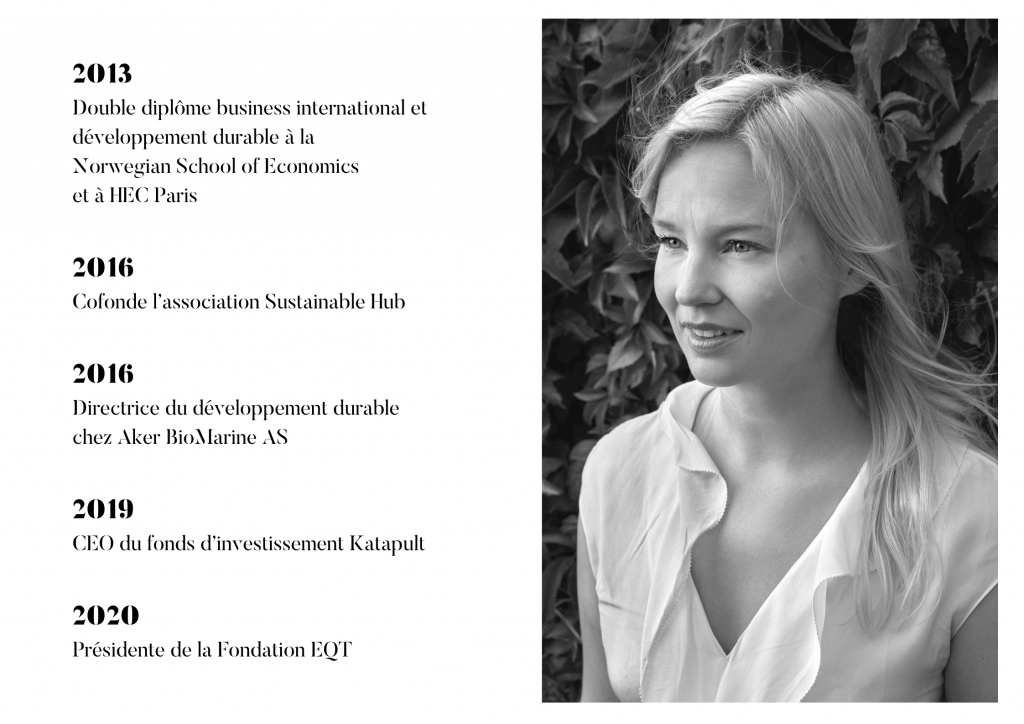Cilia Holmes Indahl (M.14) : A Foundation Looking For a Sustainable World

At just 34, Norwegian Cilia Holmes Indahl (M.14) has carved out a place for herself among the key players in the Sustainable Development ecosystem. Since 2020, she has headed the EQT Foundation, backed by one of the world’s largest private equity funds. Its objective? To finance the development of start-ups inventing disruptive solutions for the environment, health and inclusion.
5.00 AM. In her Stockholm apartment, Cilia sprays her face with water, turns on the water boiler and sets about reminding herself that “the world is a wonderful place“. Then she goes to the yoga studio. An essential routine to “refresh my ideas, disconnect from work and unleash my creativity“.
In the morning, Cilia concentrates on the most important tasks. The rest of the time, hyperactive, she’s flits around. She has one meeting after another with her teams, young start-uppers or investing partners. She prepares a documentary for which she interviews entrepreneurs and experts in financing systems. She studies the best ways to mobilize capitals and create value, both for the Foundation and for EQT. She makes slides while listening to classical music. She reads some of the thousands of applications the Foundation receives every year from entrepreneurs all over the world.
Last May, in Paris, she spoke at the Change Now Summit. On September 13, in Seoul, she will be attending the Entrepreneurship Impact Challenge, during which five Korean start-ups seeking investors will present their projects. Since the start of her career, Cilia has given over 150 talks and workshops to students and companies. “Being on stage stimulates my creativity and enriches my point of view. I don’t see these events as opportunities to spread my knowledge, but rather to confront my ideas with the audience or other speakers,” she says.
A modern Viking
This morning, Cilia takes the time to answer our questions. With her white shirt and natural look, she’s the archetypal young Scandinavian woman. Both in her looks – blonde hair, light eyes, sunny smile – and also in her way of being and living: sober, healthy, sporty, close to nature, independent, committed. She doesn’t take offense at this cliché, and is grateful to have grown up in a society that has largely allowed women to emancipate themselves.
Does this conquering, unafraid and liberated spirit also come from her Viking ancestors ? Cilia asserts that she has “a powerful masculine energy“. This doesn’t prevent her from “cultivating compassion and kindness“, or from communicating freely about her emotions when her father died or about her desire for children. For example, she reveals that she has frozen her eggs, because, for the time being, her baby is the Foundation.
Cilia believes that her strength as a leader lies in her ability to have a extreme long-term view and to combine it with the Foundation’s current resources to achieve its goals. With her staff, she favours open dialogue and diversity. She considers each person as a whole human being, with his or her professional qualities, unique personality and journey, as well as his or her personal emotions and wounds.
When she takes off her CEO’s suit, Cilia invites her friends to dinner, reads, dances, and willingly lets herself be tempted by any new experience. “Living intentionally” is her motto. For her, this means “living from the heart“, staying true to her goals and values, both at work and in her daily life. Vegetarian and anti-fast-fashion, Cilia furnished her Swedish apartment with second-hand pieces rather than from the local decorating giant. “Living intentionally also means being honest with yourself, being aware of your responsibilities, of what you can do, what you don’t do and what you could do better, without hiding reality,” she adds.
A growing commitment
Born into a family of fishermen in northern Norway, little Cilia never imagined she would arrive where she is today. Her father, whom she nicknamed Mc Gyver, was particularly adept at finding inventive solutions to everyday problems. Her hard-working mother always did her utmost. Her parents definitely helped shape Cilia’s motivation and determination to always make things better.
Her commitment to sustainable development is, according to Cilia, “logical, obvious“, carried by her Scandinavian culture. “We have a long ligneage of politicians and researchers who have advocated sustainable development since the 1970s“. Cilia also explains that in Norway – a country of mountains, sea and fjords – “people’s relationship with nature is particularly strong. Norway is also a state that had little capital before oil was found, and has developed a frugal lifestyle. In Swedish, there’s also a word to express this idea: “lagom”, which means “just enough”.
Another determining factor in the young woman’s commitment was the year she spent at HEC in 2013. She chose the SASI program because it was “the oldest and most complete course devoted to sustainable development“. There, she rubbed shoulders with biology, law and business students from all over the world. New perspectives opened up for her. “Then, I met Laurence Lehmann-Ortega and, thanks to her, my passion for sustainable business models grew. Her course and her totally new approach were really the starting point for everything I’ve done in my career“, says Cilia.
“Investing in the light at the end of the tunnel”
Back then, “some people still thought I was a hippy“, says Cilia. Today, people’s minds are changing. “The generation before me grew up in a world of fossil fuel dependency without necessarily seeing how commercial interests and lobbying was compromising democracy. But the younger generations, who have experienced a succession of crises and the stress linked to the growing media coverage of these issues, are aware of the urgency,” assures Cilia.
Advances in research are also helping to get forward on these issues. Even if progress is often too slow. “Numerous studies now show that sustainable development is a lever of economic performance for companies. We can’t measure the value of clean air and social peace (which are priceless), but there are certain things we can objectively evaluate in euros or dollars. Acting for transition reduces long-term costs and risks, secures license to operate and access to natural resources, builds customer loyalty, makes your business meaningful and thus attracts investors and talented staff. If some companies haven’t figured this out by now, they’ll eventually realize it as their financial results take a hit. Unfortunately, when it comes to climate change that develops over time and is not an immediate risk tomorrow, it will have to go even further before we will be able to collectively act,” says Cilia.
Hence the EQT Foundation’s commitment to accelerating the transition. “The amounts dedicated to the Foundation are dividends and contributions donated from EQT Partners and employees, representing 1% of the ownership in EQT and receiving 1% of the carry from EQT funds. It also administrates EQT’s philanthropic budget for giving back to society. Our reason of being is to invest in the light at the end of the tunnel,” explains Cilia. “We support entrepreneurs whose innovations could enable us to continue breathing, laughing, loving and creating on planet earth. It’s a patient investment that tolerates a high amount of risk. Our approach is deeply connected to our values at EQT of entrepreneurial spirit, respect and inclusion.”
The EQT Foundation already supports 14 start-ups and aims to add 10 more to its portfolio each year. Among them, Molecular Attraction has developed a product that attracts mosquitoes without eradicating the species, thus reducing the risk of malaria transmission. Norbite is studying an larvae capable of digesting plastics, whose larvae could be used as food and whose excrement could be transformed into organic fertilizer. Living Carbon has succeeded in genetically modifying poplar trees to accelerate their growth and thus their ability to capture carbon and supply timber for industry.
To source these start-ups, the EQT Foundation works closely with university research departments. It also uses artificial intelligence to scan the web for gems. “We select entrepreneurs according to two main criteria: firstly, the innovative aspect of the impact solution they propose; secondly, their ability to scale up, i.e. to bring sufficient value to a large part of society to eventually solve the problem in a scalable way and generate sustainable profits.” The lucky winners benefit not only from financial support, but also from the support and expertise of the EQT network in building and future-proofing companies.
Marie Tourès

Published by La rédaction

